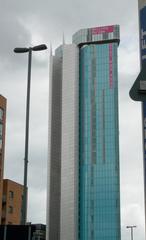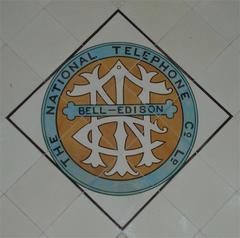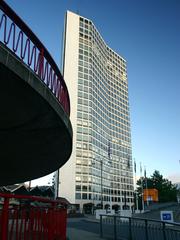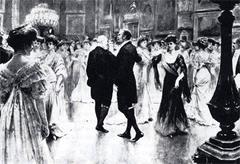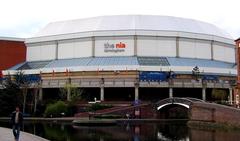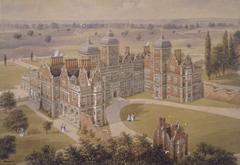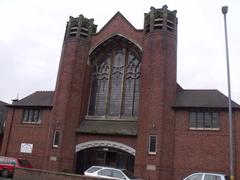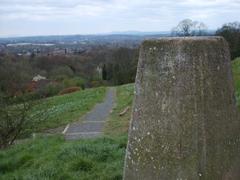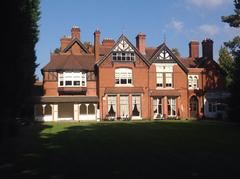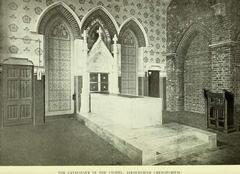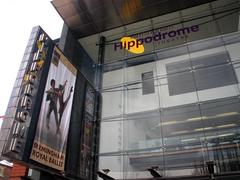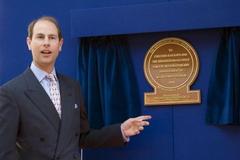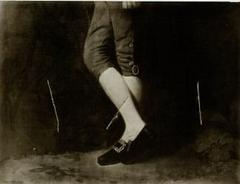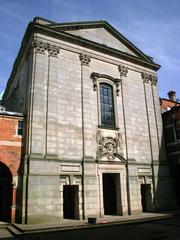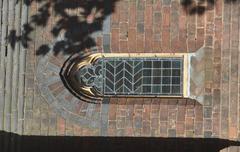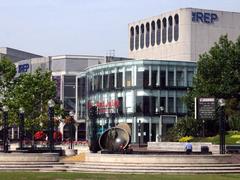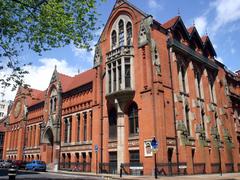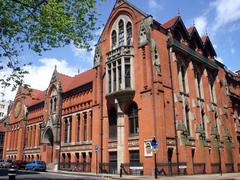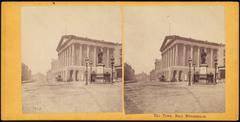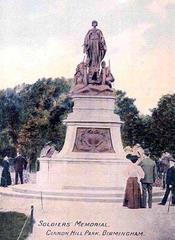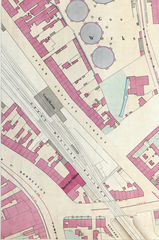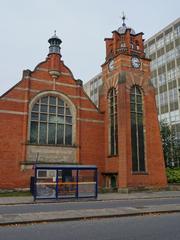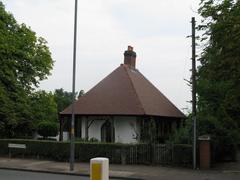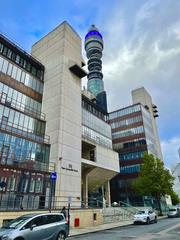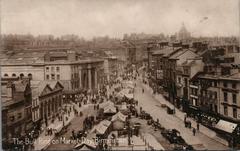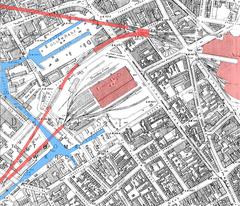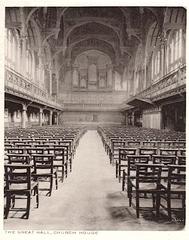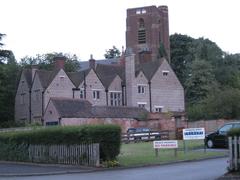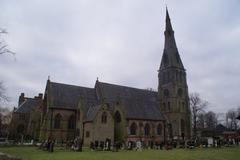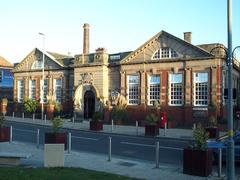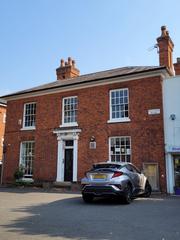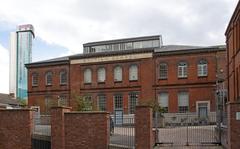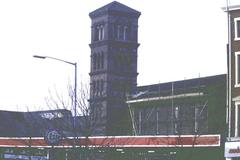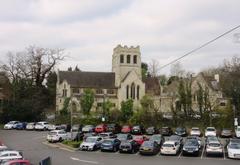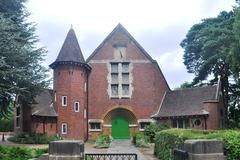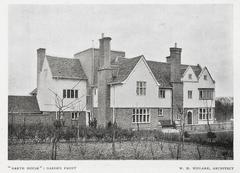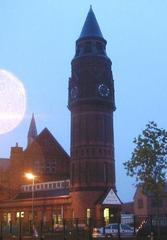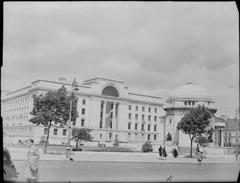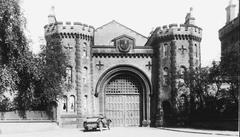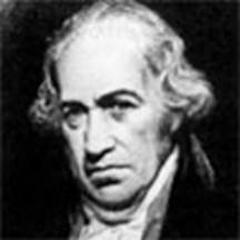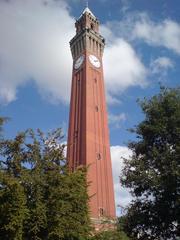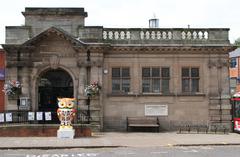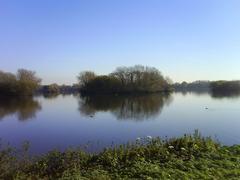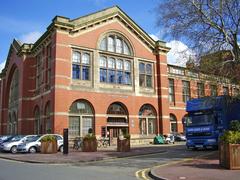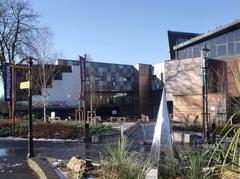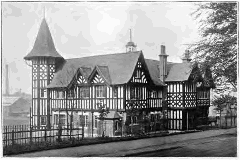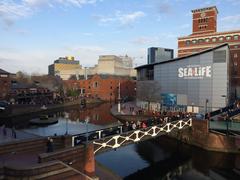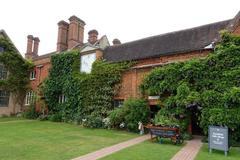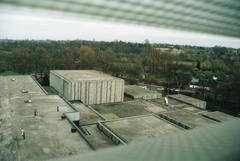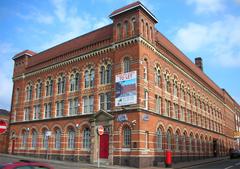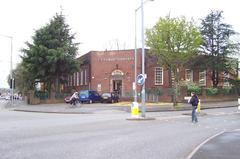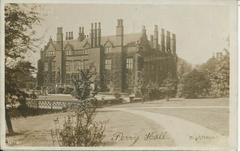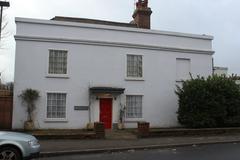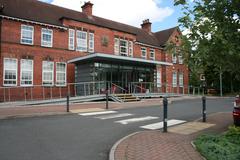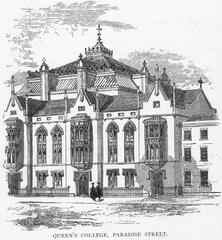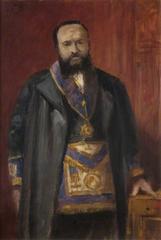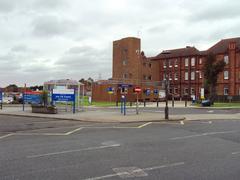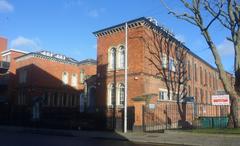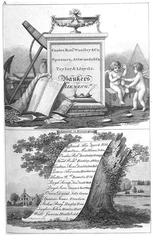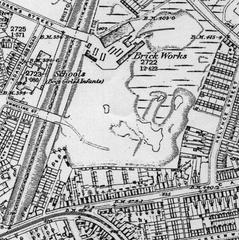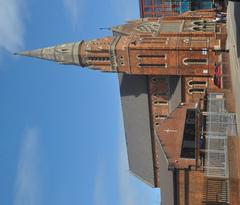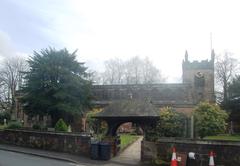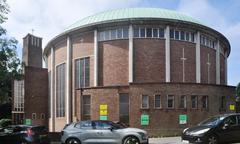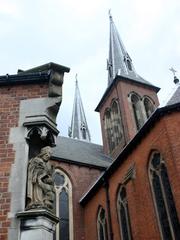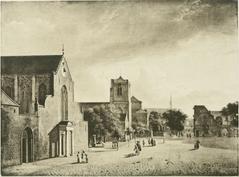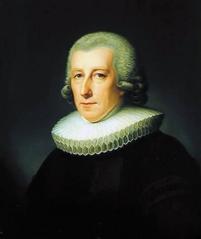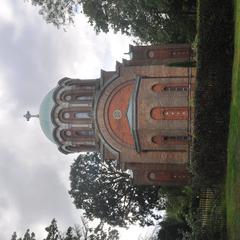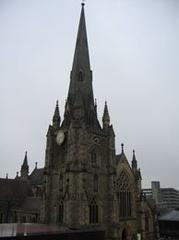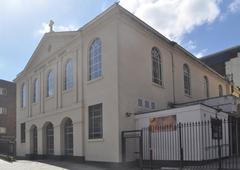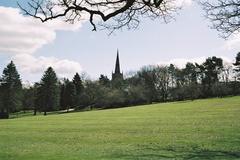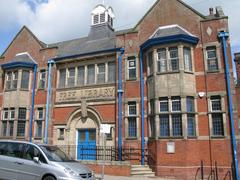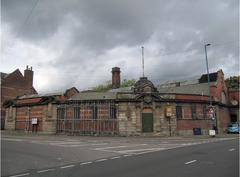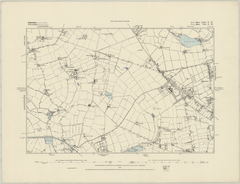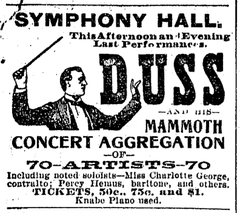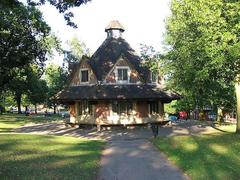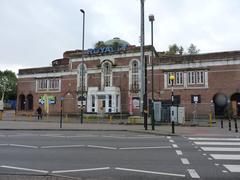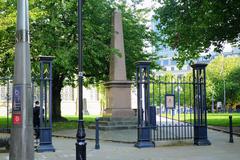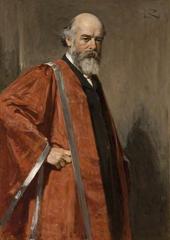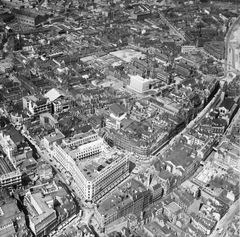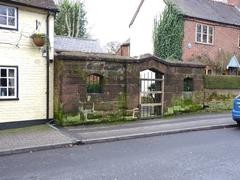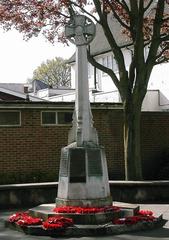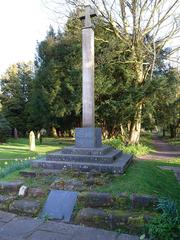Alexandra Theatre Birmingham: Visiting Hours, Tickets, and Historical Guide
Date: 14/06/2025
Introduction: History and Cultural Significance
Nestled in Birmingham’s bustling city centre, the Alexandra Theatre—affectionately known as “The Alex”—is a cornerstone of the city’s rich cultural and theatrical legacy. Opened in 1901 as the Lyceum Theatre, it quickly established itself as a prime venue for live entertainment. In 1935, the theatre underwent a stunning Art Deco transformation, blending historic elegance with modern functionality (Arthur Lloyd; Cinema Treasures). Today, The Alex continues to delight audiences with a diverse programme of West End musicals, plays, comedy, and family shows, while providing outstanding accessibility and amenities (SeatPlan; Euan’s Guide).
Its central location, near Birmingham New Street Station and city landmarks like the Bullring and Birmingham Museum and Art Gallery, makes The Alexandra an essential stop for theatre-lovers, tourists, and locals alike (ATG Tickets; Birmingham Theatre). From iconic productions to interactive heritage events, The Alex remains a vibrant hub of creativity, community, and inspiration (Theatre Village; West End Theatre).
Table of Contents
- Welcome to The Alexandra Theatre: Birmingham’s Historic Live Performance Venue
- Historical Overview
- Visiting Hours & Ticket Information
- Accessibility & Facilities
- Getting There & Nearby Attractions
- Guided Tours, Special Events & Photo Opportunities
- Programme Overview: Annual Calendar and Genres
- Notable Productions and Premieres
- Travel, Parking, and Directions
- Unique Features and Community Engagement
- Dining, Accommodation, and Local Attractions
- Celebrity Appearances and Theatre Lore
- Summary and Call to Action
- References
Welcome to The Alexandra Theatre
Step into over a century of live entertainment at The Alexandra, a historic venue welcoming generations of theatre-goers. With a reputation for excellence, inclusivity, and community engagement, The Alex offers an unforgettable experience—whether you’re seeing a blockbuster musical, attending a workshop, or exploring Birmingham’s cultural heritage.
Historical Overview
Founded in 1901, the Alexandra Theatre was originally called the Lyceum and earned the moniker “the People’s Theatre.” The 1935 Art Deco rebuild, led by Roland Satchwell and Ernest Shaufelberg, set a new standard for style and comfort. The theatre has hosted legendary artists—including Richard Attenborough, Joan Plowright, and Sir Laurence Olivier—and continues to attract acclaimed touring productions and local talent (Arthur Lloyd; Cinema Treasures).
Visiting Hours & Ticket Information
- Box Office Hours:
Monday to Saturday: 10:00 AM – 6:00 PM
Sunday: 12:00 PM – 5:00 PM (hours may extend for evening performances) - Show Times:
Evenings typically at 7:30 PM; matinees on Wednesdays and Saturdays. - Tickets:
Purchase online via the official website, by phone, or at the box office. Prices generally range from £15–£60, with discounts and family packages often available. Early booking is advised for popular events. - Special Offers:
Look for weekday discounts and seasonal promotions.
Accessibility & Facilities
The Alexandra Theatre prioritizes inclusivity for all patrons:
- Wheelchair Access: Level access to stalls via Station Street; accessible seating in Rows D, E, and T (SeatPlan).
- Accessible Toilets: Facilities on the ground floor and by accessible entrances (Euan’s Guide).
- Hearing Support: Sennheiser infra-red hearing system available in the Dress Circle.
- Assistance Dogs: Welcome throughout the venue.
- At-Seat Service: For patrons unable to access bars or other facilities.
- No Lift: Dress circle and upper circle only accessible via stairs—plan accordingly.
For assistance, contact the box office in advance or consult the AccessAble Guide.
Getting There & Nearby Attractions
Address: Suffolk Queensway, Birmingham B1 1LB
- By Train: 10-minute walk from Birmingham New Street Station.
- By Bus: Multiple routes stop near Suffolk Street and Corporation Street.
- By Car: Limited metered parking; NCP car parks at the Mailbox and Bullring.
- Cycling: Bike racks available outside the venue.
Nearby Attractions:
Explore the Bullring, Birmingham Museum and Art Gallery, Victoria Square, and the Jewellery Quarter—all within easy reach for a full day out.
Guided Tours, Special Events & Photo Opportunities
- Tours: Backstage tours are occasionally available during festivals, Heritage Open Days, or by special arrangement—contact the box office or check the official website.
- Special Events: Look for seasonal pantomimes, charity galas, and exclusive previews.
- Photography: Capture the Art Deco foyer and auditorium before and after performances (no photography during shows).
Programme Overview: Annual Calendar and Genres
The Alex hosts a dynamic mix of:
- Musicals: Touring West End hits (e.g., Dear Evan Hansen, Fiddler on the Roof)
- Drama & Plays: Acclaimed productions like War Horse, The Woman in Black
- Comedy: Stand-up and improv with top UK talent
- Concerts & Tributes: Shows like The Magic of The Beatles, Queen by Candlelight
- Family Shows & Dance: Horrible Histories, Riverdance, and more
(ATG Tickets; Birmingham Theatre; SeatPlan).
Notable Productions and Premieres
Historic Highlights
The theatre’s legacy includes classic pantomimes, variety shows, and speeches by historic figures like Neville Chamberlain (Wikipedia). In the modern era, it’s hosted iconic shows including Chicago, The Rocky Horror Show, Dirty Dancing, and 9 to 5 The Musical (ATG Tickets).
Recent and Upcoming Highlights (2025–2026)
- Dear Evan Hansen (June 2025)
- Picture You Dead (June 2025)
- The Magic of The Beatles (June 2025)
- Stage Experience: West Side Story (August 2025)
- Queen by Candlelight (August 2025)
- Riverdance 30: The New Generation (September 2025)
- Inside No 9 – Stage Fright (October & December 2025)
- 2:22 – A Ghost Story (October 2025)
- Fiddler on the Roof (Dec 2025–Jan 2026)
- The Woman in Black (January 2026)
- Operation Mincemeat, Lord of the Dance 30th Anniversary, and more (Birmingham Theatre; SeatPlan).
Travel, Parking, and Directions
- By Train: Birmingham New Street—10-minute walk.
- By Bus: Frequent city routes nearby.
- By Car: Closest NCP parking—Mailbox or Bullring.
- Accessibility: Reserved Blue Badge bays close by.
Plan your journey in advance, especially during peak performance periods.
Unique Features and Community Engagement
- Community Projects: Stage Experience encourages young local talent (ATG Tickets).
- Heritage Events: Open Days and workshops invite hands-on exploration (Theatre Village).
- Archives: Showcasing a century of Birmingham’s theatrical evolution.
Dining, Accommodation, and Local Attractions
- Dining: Numerous eateries from cafes to fine dining within walking distance.
- Accommodation: Hotels and guesthouses nearby for overnight stays.
- Attractions: Make your visit a day out with local landmarks and shopping.
Celebrity Appearances and Theatre Lore
The Alex has hosted stars from the stage and screen, as well as political figures, adding to its enduring prestige (Birmingham Mail).
Ghost Stories
The theatre is reputedly haunted, with tales of founder Leon Salberg’s ghost and other supernatural encounters—an inspiration for themed shows like 2:22 – A Ghost Story (Birmingham Theatre).
Summary and Call to Action
The Alexandra Theatre is a living testament to Birmingham’s creative spirit, blending heritage architecture, world-class performances, and a welcoming, accessible environment. Whether attending a major musical, enjoying a family show, or exploring its Art Deco charm, The Alex offers an experience to remember.
Plan your visit today:
- Check show listings and tickets.
- Review accessibility and travel tips.
- Explore upcoming events and community engagement opportunities.
Stay connected by following The Alexandra on social media and downloading the Audiala app for up-to-date news and offers.
References
- Arthur Lloyd
- Cinema Treasures
- ATG Tickets
- SeatPlan
- Euan’s Guide
- Theatre Village
- West End Theatre
- Birmingham Theatre
- Heritage Open Days
- WhatsOnStage
- Birmingham Mail
- Wikipedia
